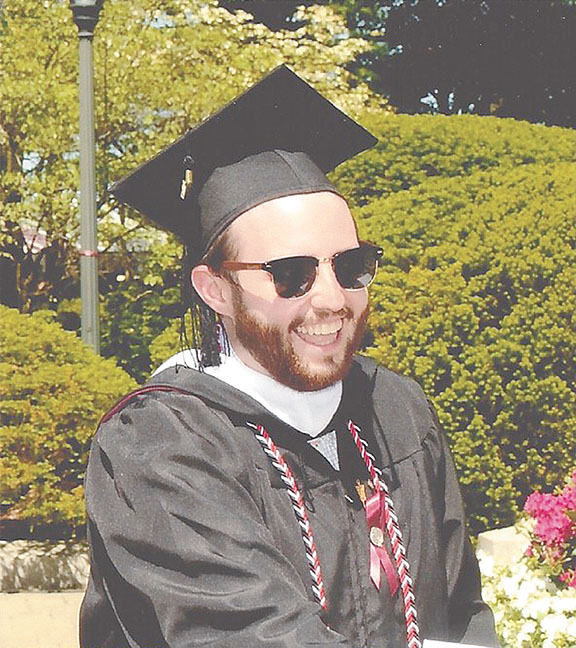By Tim McLoone
John Francis “Jack” McLoone entered this world July 10, 1997. His arrival was not an ordinary one as he had been diagnosed, in utero, with a condition that embedded his right lung with cysts. A “crash team” was standing by in case his lungs didn’t fire up at birth but, fortunately, he gave out a big howl shortly thereafter and all was well…temporarily.
The medical staff at Children’s Hospital of Philadelphia decided that six weeks later it would be best to have the lower lobe of Jack’s right lung removed. As frightening as this sounded for a newborn, we were encouraged by the information we received as to his recovery and that lung tissue would regenerate for many years leading to what should be mostly normal lung capacity.
After the successful surgery, we returned for a checkup and were told that everything went fine and a complete recovery was anticipated. The one disquieting note came from the surgeon who cautioned, “I don’t want to alarm you, but these things tend to not travel alone, so keep your eye on this boy and be vigilant.” We thanked him over and over for his expertise and we went on our way.
Nine years went by and inexplicably our otherwise “normal” boy began to fade for no apparent reason. He had always loved to read but suddenly lost the energy to do that. His appetite also began to diminish which was really unusual, and he complained of pain in the area of the incision on his back through which doctors had removed part of his lung those nine years earlier. Recalling the surgeon’s warning, we returned to CHOP to see what they thought was going on. X-rays disclosed a mass in Jack’s chest, but the thought was that the removal of that lung had created a vacuum that caused surrounding organs to fill the spot, hence a “mass.”
Hearing that he was apparently OK, Jack surged for a few days but then came the big crash. His energy level dropped even further and he took on a grayish pallor. Blood work was done and the results were catastrophic – Jack had leukemia, specifically acute lymphoblastic leukemia (ALL).
The staff at the Valerie Center at Monmouth Medical encouraged us that, no, our sweet boy was not going to die the next day or the next week, but we were all about to embark on a three-and-a-half-year journey filled with chemotherapies to destroy generations of white cells where the leukemia lived. Jack was actually cancer-free in just a few weeks but that was only the beginning of the battle. The treatment had to teach his bone marrow a lesson: Don’t do it again!
We had a lot to learn.
With ALL there are two types: B cell and T cell. Unfortunately for Jack, his form was the latter. The T cell type is more resistant to treatment and is, therefore, also more prone to relapse. The protocol for T cells also mandated cranial radiation which scared the heck out of us. Jack was actually administered an IQ test before and after the radiation treatments began to see what effect this would have on his neuro functions.
So, the battle was on. Fortunately for Jack, his mother is what I would come to call a “world-class mom” and she marshaled all the resources available to us including the help of her large family. After all, we had three other children to take care of and everyone was impacted by this. Jack was soon referred to as a “frequent flier” at Monmouth Medical because of his usually unscheduled stays which could be overnight or even a matter of weeks. We never knew. Because his immune system was severely compromised, Jack was susceptible to every disease available, and there were many. Our favorite nurse referred to this as the “Jack Rules”; if something could happen to a patient, it would happen to Jack. He had bouts of shingles, C. diff, the flu, and sepsis, the latter being the one that almost took him.
While all of this was going on, Jack missed all of fourth grade and much of fifth and sixth. He could tolerate working with tutors sometimes but even that was difficult for him. I don’t think any child had ever enjoyed school more than Jack did so he was devastated by missing out on so many things, including his beloved baseball. This boy who rarely complained about the incessant injections, nausea and hospitalizations soldiered on through it all.

One evening, he was actually inconsolable because “I can’t remember my times table.” There is a syndrome called “chemo brain” that might have been responsible for that and there was also the cranial radiation. We didn’t know. He also got upset when he found out he would be taking Spanish and everyone else had had it in 4th grade, which he missed. His kindly (and sorely missed) principal at Markham Place School, Mr. Merce, assured Jack that he could take it “pass/fail.” We found that to be hilarious but our studious young boy was greatly relieved.
Well, Jack did complete his three-and-a-half years and, mercifully, never relapsed. Others have not been as fortunate. With the help of his mom, siblings, extended family and friends, the staffs at Monmouth Medical and Hackensack University Hospitals, and his teachers at Point Road, Markham Place and Red Bank Regional High School, Jack re-entered the academic and social world.
You should know one other thing. That boy who endured the chemo, the radiation, the diseases, and couldn’t remember his “times tables” graduated from Fordham University May 18, 2019 – summa cum laude.














